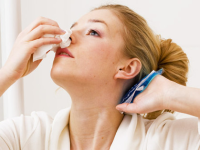Nosebleeds
 Overview
Overview
Nosebleeds are a fairly common condition and can occur at virtually any age. The bleeding can be anything from a small trickle to a heavy flow that lasts more than 15 minutes. Some individuals have isolated nosebleeds, while others have recurring problems.
Certain people are prone to nosebleeds, usually because of a deviated septum or a deformity in the cartilage located between the nostrils.
Nosebleeds are most often harmless and easily stopped. Frequent and heavy nosebleeds, however, should be recognized as a sign to see a doctor.
Causes of Nosebleeds
Because two of the main causes of nosebleeds are dry air and colds, nosebleeds are more common during the winter months. Heating systems tend to dry out indoor air, causing the nasal membranes to dry out. This increases the risk that the fragile blood vessels in the nasal passages will break.
Colds cause an inflammation in the nostrils, which can also lead to damage of the blood vessels. Blowing the nose frequently and with too much force can also start a nosebleed.
There are a few other common causes of nosebleeds. These include:
- Respiratory allergies
- Trauma to the nose
- Inhalation of irritating chemicals
- Medications that thin the blood
Children can be subject to nosebleeds because of picking their nose or inserting a foreign object into their nostrils.
In some rare cases, nosebleeds which are frequent can be caused by an underlying illness such as high blood pressure, blood-clotting problems, or a growth in the nose.
Prevention
Nosebleeds can frequently be prevented simply by increasing the humidity indoors during the winter, either by the use of a central air humidifier or a room humidifier.
The nostrils can also be moistened by placing a small amount of petroleum jelly inside the nose each day or by using saline nose drops.
Precautions should be taken to avoid getting colds (by washing hands frequently). When the nose needs to blown, do so gently.
Diagnosis
In the case of a nosebleed, diagnosis is usually unnecessary because the condition is obvious, minor and short-lived. However, in the case of frequent and heavy nosebleeds, a physician should be consulted for a diagnosis which may unveil an underlying cause.
Treatments
Nosebleeds can typically be stopped at home using a simple remedy.
- Home remedies: Cover the nose with a tissue while pinching the end of the nose with the fingers and tilting the head forward. This should be done for five minutes before checking to see if the bleeding has stopped. A cold compress can be applied to the bridge of the nose to stop the bleeding more quickly.
- Medical treatments: For recurrent and severe nosebleeds, medical treatment may be necessary. A physician may choose to cauterize a weakened blood vessel with heat or silver nitrate to seal it. Other treatments include packing the nostril with gauze to stop the bleeding. Once the bleeding is under control, the doctor may reduce or eliminate the use of blood-thinning medications, or attempt to control high blood pressure or other conditions which may be contributing to the recurring nosebleeds.
Natural Remedies
Some natural treatments can be used, including the following:
- Diet – Eating two to three servings of leafy, green vegetables per day can provide the nutrients needed to help the blood to clot.
- Supplements – Vitamin C deficiency is often associated with nosebleeds. Adults should take 2,000 mg daily with between 500 and 1,000 mg of bioflavanoids. Children should take 250 to 500 mg with 100 to 200 mg of bioflavanoids. Vitamin K deficiencies can also cause nosebleeds.
- Topical herbs – Agrimony, yarrow and witch hazel are astringent herbs that can be used topically to decrease or eliminate bleeding.
- Consumed herbs – Bilberry decreases the fragility of small blood vessels. Between 120 and 240 mg should be taken daily. Nettle tea contains vitamins A and C, which also work to strengthen the nasal membranes.
Arnica can be used if the nosebleed was triggered by a minor accident to the nose. It will help to relieve the physical trauma and encourage the body to recover.
Ipecac can be used for nosebleeds that are gushing bright, red blood. Other symptoms here can include cold sweats or nausea. Queasiness caused by any kind of movement may also be present.
Phosphorous is particularly helpful in stopping nosebleeds that occur from blowing the nose frequently during a cold. Other symptoms can also include noticeable anxiety because of the bleeding.
Carbo veg is a potential remedy for nosebleeds that are characterized by a steady, oozing loss of blood. Symptoms can include a sensation of dizziness or fainting during the bleeding. Burning sensations are common, along with a craving for cool, fresh air.
The routine use of herbs to improve the integrity of the blood vessels and to reduce inflammation and irritation in the nasal passages is a good idea once bleeding is under control.
Herbs to Avoid for Nosebleeds
Gingko biloba can increase the risk of bleeding and should not be taken by those people who are subject to recurring nosebleeds.
References
- Bratman, S. The Alternative Medicine Ratings Guide: an expert panel rates the best treatments for over 80 conditions, Prima Health A Division of Prima Publishing (1998)
- Brown, L. Alternative Medicine, NTC/Contemporary Publishing (1999)
- Deepak Chopra, M.D. Alternative Medicine: The Definitive Guide, Celestial Arts (2002)
- Servan-Schreiber, D. The Encyclopedia of New Medicine: Conventional & Alternative Medicine For All Ages, Rodale International Limited (2006)
Posted in Nosebleeds
Ask a Question Or Join a Discussion


